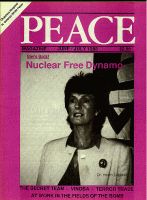
Peace Magazine Jun-Jul 1988, page 19. Some rights reserved.
Search for other articles by Ted Turner here
Search for other articles by Prince Sadruddin Aga&# here
At last the superpowers are making progress on nuclear arms reductions. In Europe, governments are busy trying to agree on how to bring their defences into line with the new realities heralded by the signing of the INF Treaty. The U.S. and the Soviets, for their part, are pressing ahead with negotiations for very deep cuts in strategic nuclear weapons. Those committed to nuclear sanity sigh with relief.
But many, rightly, are still skeptical. Who knows what change of wind the Presidential elections in the United States will bring, or how long the new thinking in Moscow will last?
And while the talks go on, a series of regional conflicts, civil wars, and insurgencies challenge the new detente. Mortal conflicts fester in the Third World: in Afghanistan, Central America, the Horn, and Southern Africa, Iran-Iraq, the Middle East, Southeast Asia, and Sri Lanka. Other deep-rooted rivalries continually threaten to re-surface and add to global violence.
Ironically, while the Superpowers show signs of moderating their nuclear competition, another arms race escalates, one that is potentially more deadly. For the U.S. Soviet realization that nuclear weapons are militarily useless is not necessarily echoed elsewhere in the world.
On the contrary, having "the bomb" is considered of utmost utility in some nations struggling to secure their frontiers or even their very existence. India, Pakistan, Israel, and South Africa already have nuclear weapons or the ability to produce them quickly. Argentina, Brazil, and South Korea might not be far behind. Others are showing signs of wanting to acquire the necessary wherewithal, among them Iran, Iraq, and Libya. The race for the bomb is gathering speed, the competition intensifying.
MOST OMINOUS OF ALL, THE ATTRACTIONS of the bomb to determined terrorists must be irresistible. The technology to make a suitcase or back-pack bomb already exists. In our market-oriented societies, is it really all that surprising that the skills, hardware, and raw materials like plutonium needed to make the bomb are commercially available? Profit means more than security to many.
Whatever governments and multilateral regulatory agencies say, national and international restrictions have been paper barriers to those with the funds and determination to get what they want. It is only a question of time before terrorists, or states prepared to resort to terror, acquire the bomb.
So while tentative progress is being made around conference tables in the northern hemisphere, the lethal trade continues and the possibilities of regional nuclear exchanges increase. Most people now accept that any nuclear explosion would have devastating environmental and human consequences. How long must we wait for the international community to translate into concrete action humankind's shared interest in halting proliferation?
Ultimately, an international commitment to defusing regional conflicts is the best guarantee against proliferation. For only reliable guarantees of each nation's security will remove the fundamental incentive among those seeking the bomb.
Meanwhile, both Americans and Soviets know there are practical steps that can be taken now to reduce the pace and risk of proliferation. Discussed on the bilateral agenda in Helsinki and elsewhere for years, they include greater support for more stringent controls by the International Atomic Energy Agency in policing nuclear power plants, both civilian and military, and more vigorous enforcement of the Nuclear Non-Proliferation Treaty. Commercial trade in plutonium must be curtailed sharply, if not eliminated outright, and nuclear supplier nations must condition any sales of weapons-usable materials or technology upon strict, enforceable safeguards against weapons diversions. Finally, decisive action needs to be taken against the profiteers now at liberty to pursue their trade in terror.
We have lived in horror of the prospects of nuclear holocaust at the hands of the Superpowers. We can barely imagine the risks inherent in a world where scores of countries and leaders - "reasonable" and "unreasonable" alike - add their fingers to the nuclear trigger. In the business of curbing proliferation, time lost might never be regained.
Ted Turner is Chairman of Turner Broadcasting. Prince Sadruddin Aga Khan is former U.N. High Commissioner for Refugees and President of Groupe de Bellerive. Both are Directors of the Better World Society, a nonprofit group concerned with global issues, which produced a TV documentary on nuclear proliferation, seen on Turner Broadcasting in April.

Peace Magazine Jun-Jul 1988, page 19. Some rights reserved.
Search for other articles by Ted Turner here
Search for other articles by Prince Sadruddin Aga&# here